高一英语教案:必修一 10种动词时态总结 Word版
四川省宜宾市一中高一英语 语法专项(一)时态教学设计-人教版高一全册英语教案
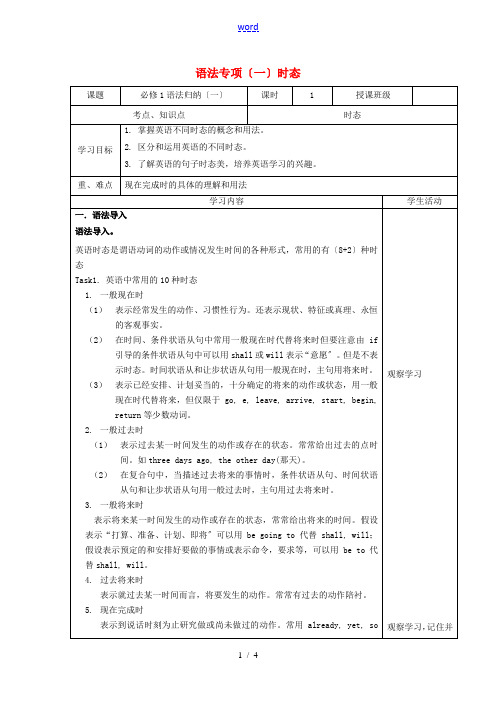
语法专项〔一〕时态far, by now, since two days ago, for a few days, 等词语做状语。
运用。
注意:give, see, e, arrive, leave, begin, start, finish, join, bee, borrow,lend, die, end等点时间动词可以用于完成时,但是在肯定句中不能与表示一段时间的since和for短语连用,因为点时间动词不能够延续,而在否定句中可以与表示一段时间的for短语连用,因为否定的点时间动词可以看做一种可延续的状态。
6.过去完成时表示截止到过去某一时刻或在过去的动作之前已经做或尚未做的动作。
7.现在进行时(1)表示现状正在进行的动作;(2)有时候用现在进行时表一般将来时,表示不久将要发生的动作,主要用于e, go, leave, arrive, start.等动词。
8.过去进行时表示过去某一时刻或过去某一段时间内正在进行的动作;句中常有过去的点时间或过去动作陪衬。
9.现在完成进行时表示从过去某一时间开始,一直延续到现在还在进行的动作。
10.过去完成进行时表示从过去某一时间开始,一直延续到过去的另一时间还在进行的动作。
Task2. 指出以下句子的不同时态1. She regretted telling Jane about her own affairs._____________________2. My neighbor does outdoor exercises every morning. ________________3. When he arrives, I will let you know. ______________________4. The train from Harbin arrives at 5:30 this afternoon.________________5. When are you going to answer them? _____________6. The meeting is to be held next Monday. ____________7. Mike has been here for a year. ____________8. He said he would not e home that day. _______________9.The manager is studying the contract.____________10. She said she would give me a gift when she came again.______________11.The train is leaving in 5 minutes. ______________12. At 9 pm last night, I was watching football on TV.13. You have been working for hours. You should stop to have a rest._________14. When the secretary came in and interrupted us, we had been talkingfor an hour. _______二.重难点探究探究点一:语境中的过去式,往往表示“刚才、刚刚〞之意,暗指现在已经“不再这样〞。
高一英语教案:必修一 英语十六种时态 Word版
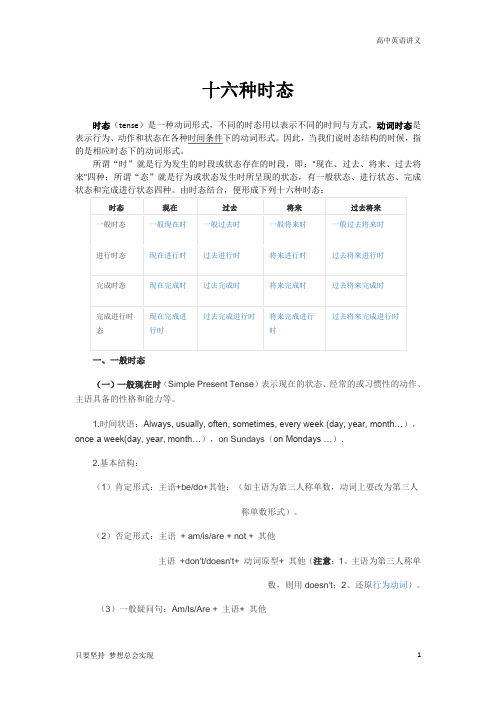
十六种时态时态(tense)是一种动词形式,不同的时态用以表示不同的时间与方式。
动词时态是表示行为、动作和状态在各种时间条件下的动词形式。
因此,当我们说时态结构的时候,指的是相应时态下的动词形式。
所谓“时”就是行为发生的时段或状态存在的时段,即:"现在、过去、将来、过去将来"四种;所谓“态”就是行为或状态发生时所呈现的状态,有一般状态、进行状态、完成(1)主语+ am/is/are + not+ going to + do sth (2)主语+ will/shall + not+ do sth5.一般疑问句:be放于句首;will/shall提到句首。
{首字母大写}(1)Am/Is/Are + going to + 主语+ do sth(2)Will/Shall +主语+ do sth6.例句:(1)They are going to have a competition with us in studies.他们将有一场比赛和我们一起研究。
(2)It is going to rain.天要下雨了。
(四)一般过去将来时1.概念:立足于过去某一时刻,从过去看将来,常用于宾语从句中。
2.时间状语:The next day (morning \, year…),the following month(week…),etc.3.基本结构:(1)主语+ was/were + going to + do + 其它(2)主语+ would/should + do +其它4.否定形式:(1)主语+ was/were + not + going to + do(2)主语+ would/should + not + do5.一般疑问句:was或were放于句首;would/should 提到句首。
(1)Was/Were + 主语+ going to + do + 其它(2)Would/Should + 主语+do +其它6.例句:(1)He said he would go to Beijing the next day.他说他第二天要去北京。
高中英语时态总结
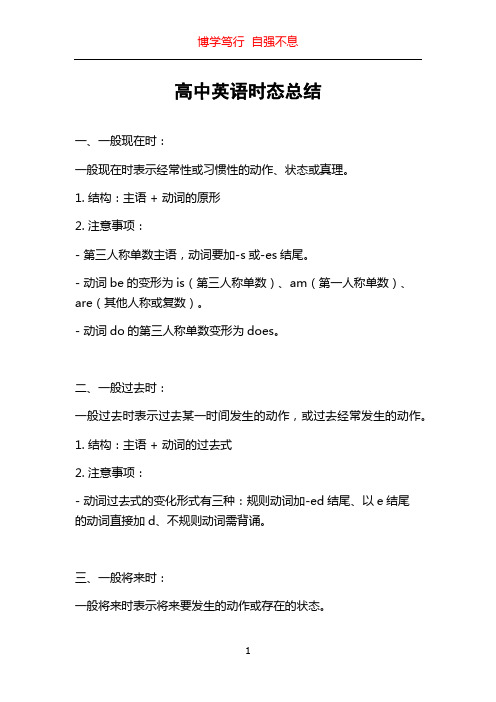
高中英语时态总结一、一般现在时:一般现在时表示经常性或习惯性的动作、状态或真理。
1. 结构:主语 + 动词的原形2. 注意事项:- 第三人称单数主语,动词要加-s或-es结尾。
- 动词be的变形为is(第三人称单数)、am(第一人称单数)、are(其他人称或复数)。
- 动词do的第三人称单数变形为does。
二、一般过去时:一般过去时表示过去某一时间发生的动作,或过去经常发生的动作。
1. 结构:主语 + 动词的过去式2. 注意事项:- 动词过去式的变化形式有三种:规则动词加-ed结尾、以e结尾的动词直接加d、不规则动词需背诵。
三、一般将来时:一般将来时表示将来要发生的动作或存在的状态。
1. 结构:主语 + will + 动词的原形2. 注意事项:- 当主语为第一人称时,可用shall代替will。
- 当表示将来的时间副词或状语连用时,将来时常和动词的原形连用。
四、现在进行时:现在进行时表示现在正在发生的动作。
1. 结构:主语 + am/is/are + 动词的ing形式2. 注意事项:- 动词-ing形式的构成规则为动词原形结尾加-ing。
- 动词末尾的e需去掉,再加-ing。
- 重读闭音节,末尾只有一个辅音字母时,应将末尾辅音字母双写,再加-ing。
五、过去进行时:过去进行时表示过去某一时间正在进行的动作。
1. 结构:主语 + was/were + 动词的ing形式2. 注意事项:- 动词-ing形式的构成规则同现在进行时。
- 句中使用过去进行时时,一般还需要使用表状态动词的动词-ing 形式。
六、将来进行时:将来进行时表示将来某一时间正在进行的动作。
1. 结构:主语 + will be + 动词的ing形式2. 注意事项:- 动词-ing形式的构成规则同现在进行时。
七、一般过去将来时:一般过去将来时表示过去的某个过去时间点本来要发生的事情,但实际上未发生。
1. 结构:主语 + would + 动词的原形2. 注意事项:- would在句中只表示动词的一种形式,无人称和数的变化。
高一英语时态知识点总结
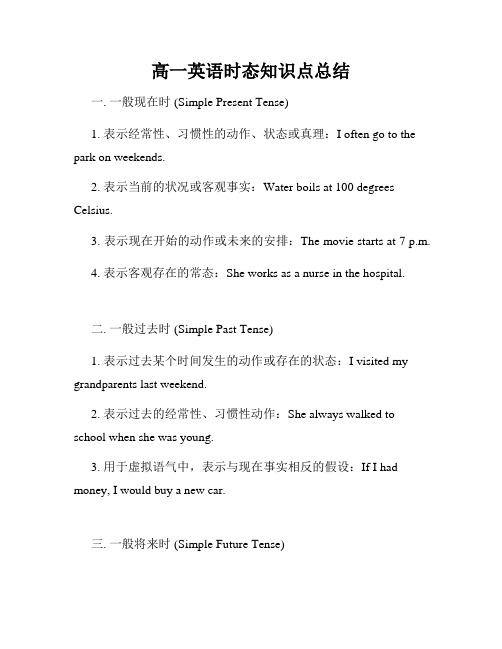
高一英语时态知识点总结一. 一般现在时 (Simple Present Tense)1. 表示经常性、习惯性的动作、状态或真理:I often go to the park on weekends.2. 表示当前的状况或客观事实:Water boils at 100 degrees Celsius.3. 表示现在开始的动作或未来的安排:The movie starts at 7 p.m.4. 表示客观存在的常态:She works as a nurse in the hospital.二. 一般过去时 (Simple Past Tense)1. 表示过去某个时间发生的动作或存在的状态:I visited my grandparents last weekend.2. 表示过去的经常性、习惯性动作:She always walked to school when she was young.3. 用于虚拟语气中,表示与现在事实相反的假设:If I had money, I would buy a new car.三. 一般将来时 (Simple Future Tense)1. 表示将来某个时间将要发生的动作:We will have a party next Saturday.2. 表示将来的意图、打算或预测:I think it will rain tomorrow.3. 表示请求、意愿、建议或威胁:You will do as I say.四. 现在进行时 (Present Continuous Tense)1. 表示现阶段正在进行的动作:She is studying for her exams.2. 表示现阶段经常会发生的动作:I am always losing my keys.3. 表示近期计划或安排:I am meeting my friends for dinner tonight.五. 过去进行时 (Past Continuous Tense)1. 表示过去某个时间正在进行的动作:He was playing soccer when it started raining.2. 表示过去某一段时间内频繁或习惯性进行的动作:I was studying until late last night.六. 将来进行时 (Future Continuous Tense)1. 表示将来某个时间正在进行的动作:This time tomorrow, I will be flying to Paris.2. 表示将来某一段时间内的频繁或习惯性进行的动作:Next month, we will be working on a new project.七. 现在完成时 (Present Perfect Tense)1. 表示过去发生并与现在有关的动作或经验:I have visited Japan twice.2. 表示过去开始并一直持续到现在的动作:She has lived in this city for five years.3. 表示过去多次发生的动作:We have seen that movie before.八. 过去完成时 (Past Perfect Tense)1. 表示过去某个时间点之前已经完成的动作:He had already left when I arrived.2. 表示过去某个时间段之前一直持续的动作:She had been studying English for six years before she moved to Canada.九. 将来完成时 (Future Perfect Tense)1. 表示将来某个时间点之前将会完成的动作:By the end of this month, I will have finished the project.2. 表示将来某一段时间之前一直持续的动作:By the time she graduates, she will have been studying for eight years.十. 现在完成进行时 (Present Perfect Continuous Tense)1. 表示从过去开始一直持续到现在,并可能继续下去的动作:I have been studying English for two hours.2. 表示持续不断的、反复发生的动作:It has been raining all day.十一. 过去完成进行时 (Past Perfect Continuous Tense)1. 表示过去某个时间点之前持续进行的动作:He had been working for 10 hours before he took a break.2. 表示过去某段时间内反复发生的动作:I had been calling her, but she didn't answer.以上是高一英语时态的知识点总结,了解这些时态的用法和特点,能够帮助你更好地理解和运用英语的时态。
(完整word版)高中英语动词时态详解分析

动词时态动词用以表示动作或存在状态。
有人称和数的变化,有时态、语态和语气的特征。
一、动词时态-----* 用不同的动词形式来表示不同时间里以不同方式状态发生的动作或存在。
* 时有,现在、过去、将来、过去将来;态有,一般、进行、完成、完成进行。
* 英语句子中,通过谓语动词的形式变化来指示动作的时间和状态,还有时间状语来参照帮助说明动作的时间和状态。
各种时态的句型变化:(更多的时态)1、一般现在时①表示客观事实或普通真理(不受时态限制)The geography teacher told us the earth moves around the sun.Water boils at 100oC. Three plus three is six.②表示经常或习惯性的动作,多用动作动词,且常与表频率的时间状语连用。
We always care for each other and help each other. She gets up at six every morning.③表示主语的现状、性质、特征、状态时多用系动词或状态动词.He is a student. She hates computer games. The bottle holds a quarter of a pound of ink.Ice feels cold. He is happy. My father is at work.④在时间、条件、让步状语从句(when, while, if, even though)中常用一般现在时代替将来时。
但要注意由if 引导的条件状语从句中可以用shall或will表“意愿”,但不表示时态。
When he arrives, he will let you know. Even if it rains, the sports meeting will continue.If you will accept my invitation and come to our party, my family will be pleased.如果你愿意接受并参加我们的舞会,我的家人会非常高兴。
(完整word版)动词时态和语态总结,文档
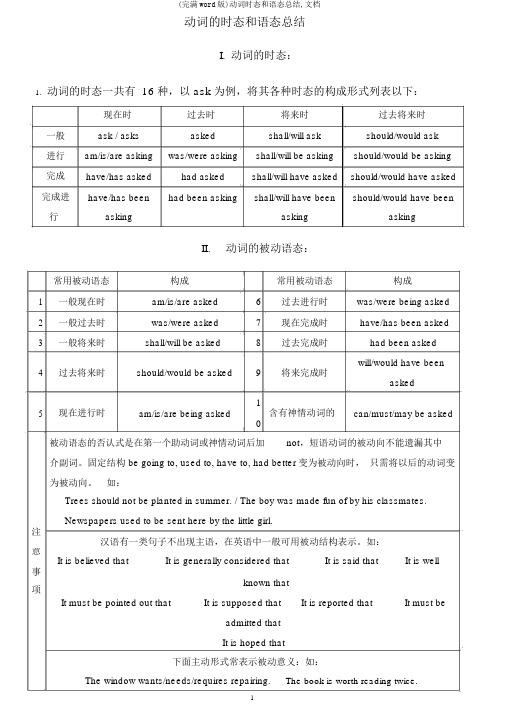
动词的时态和语态总结I.动词的时态:1.动词的时态一共有 16 种,以 ask 为例,将其各种时态的构成形式列表以下:现在时过去时将来时过去将来时一般ask / asks asked shall/will ask should/would ask 进行am/is/are asking was/were asking shall/will be asking should/would be asking 完成have/has asked had asked shall/will have asked should/would have asked 完成进have/has been had been asking shall/will have been should/would have been 行asking asking askingII.动词的被动语态:常用被动语态构成常用被动语态构成1一般现在时am/is/are asked6过去进行时was/were being asked 2一般过去时was/were asked7现在完成时have/has been asked 3一般将来时shall/will be asked8过去完成时had been asked4过去将来时should/would be asked9将来完成时will/would have beenasked5现在进行时am/is/are being asked 1含有神情动词的can/must/may be asked 0被动语态的否认式是在第一个助动词或神情动词后加not,短语动词的被动向不能遗漏其中介副词。
固定结构 be going to, used to, have to, had better变为被动向时,只需将以后的动词变为被动向。
如:Trees should not be planted in summer. / The boy was made fun of by his classmates.Newspapers used to be sent here by the little girl.注汉语有一类句子不出现主语,在英语中一般可用被动结构表示。
高一高频动词及其时态运用总结
高一高频动词及其时态运用总结英语动词的时态运用是英语学习中的一个重要部分,尤其对于高中一年级的学生来说,掌握高频动词及其时态运用是建立英语语言基础的重要环节。
本文将总结高一阶段常用的高频动词及其时态运用,帮助同学们更好地理解和运用这些动词。
一、一般现在时态 (Simple Present Tense)一般现在时用于表示经常性的动作、习惯、真理、常规等。
1. 动词原形 (Base Form):表示一般现在时的谓语动词通常使用动词的原形。
例如:- I go to school by bus every day. (我每天坐公交车去学校。
)- He likes playing basketball. (他喜欢打篮球。
)- The sun rises in the east. (太阳从东方升起。
)2. 第三人称单数的变化:在第三人称单数主语前,谓语动词要加上-s或-es。
例如:- She finishes her homework before dinner. (她在晚饭前完成她的作业。
)- Tom often goes to the library. (汤姆经常去图书馆。
)二、一般过去时态 (Simple Past Tense)一般过去时用于表示过去发生或存在的动作、经历。
1. 动词过去式:表示一般过去时的谓语动词通常使用动词的过去式。
例如:- I played soccer with my friends yesterday. (昨天我和朋友们踢足球。
) - She walked to school this morning. (今天早上她走路去学校。
)- They visited their grandparents last week. (上周他们拜访了他们的祖父母。
)2. be动词的一般过去时变化:- I was at home yesterday. (昨天我在家。
)- He was in London last month. (上个月他在伦敦。
高一知识点动词时态的用法总结
高一知识点动词时态的用法总结在英语学习中,动词时态是一个非常重要的知识点。
时态的正确使用可以帮助我们准确地表达过去、现在和将来的动作和状态。
本文将对高一知识点中的动词时态的用法进行总结,帮助学生更好地掌握这一知识点。
一、一般现在时(Simple Present)一般现在时用于表示经常性的动作、习惯、真理和客观事实等。
其基本结构为主语+动词原形。
例如:1. I play basketball every weekend.(我每周末打篮球。
)2. Water boils at 100 degrees Celsius.(水在100摄氏度沸腾。
)二、一般过去时(Simple Past)一般过去时用于表示过去某个时间发生的动作或状态。
其基本结构为主语+动词过去式。
例如:1. I visited my grandparents last week.(我上周去看望了我的祖父母。
)2. She lived in London for five years.(她在伦敦住了五年。
)三、一般将来时(Simple Future)一般将来时用于表示将来某个时间要发生的动作或状态。
其基本结构为主语+will+动词原形。
例如:1. I will go shopping tomorrow.(我明天要去购物。
)2. They will have a meeting next Monday.(他们下周一要开会。
)四、现在进行时(Present Continuous)现在进行时用于表示现在正在进行的动作或事件。
其基本结构为主语+am/is/are+动词的现在分词。
例如:1. He is studying in the library now.(他现在正在图书馆学习。
)2. They are having dinner at a restaurant.(他们正在餐馆吃晚饭。
)五、过去进行时(Past Continuous)过去进行时用于表示过去某个时间正在进行的动作或事件。
高一英语必修1语法总结
高一英语必修1语法总结1. 时态英语中常用的时态有以下几种:一般现在时、一般过去时、一般将来时、现在进行时、过去进行时、将来进行时、过去完成时、将来完成时等。
1.1 一般现在时(Simple Present Tense)一般现在时表示经常性或习惯性的动作、状态、规律或真理。
•结构:主语 + 动词原形(第三人称单数动词需加-s或-es)•例句:He goes to school every day.(他每天去学校)1.2 一般过去时(Simple Past Tense)一般过去时表示在过去某个时间发生或存在的动作或状态。
•结构:主语 + 动词过去式•例句:She lived in London for five years.(她在伦敦住了五年)1.3 一般将来时(Simple Future Tense)一般将来时表示将来某个时间要发生的动作或存在的状态。
•结构:主语 + will + 动词原形•例句:They will have a meeting tomorrow.(他们明天要开会)1.4 现在进行时(Present Continuous Tense)现在进行时表示现在正在进行的动作。
•结构:主语 + am/is/are + 动词-ing•例句:I am studying English now.(我正在学英语)1.5 过去进行时(Past Continuous Tense)过去进行时表示过去某个时间正在进行的动作。
•结构:主语 + was/were + 动词-ing•例句:They were playing basketball at that time.(他们那时正在打篮球)1.6 将来进行时(Future Continuous Tense)将来进行时表示将来某个时间正在进行的动作。
•结构:主语 + will be + 动词-ing•例句:I will be studying at this time tomorrow.(明天这个时候我将在学习)1.7 过去完成时(Past Perfect Tense)过去完成时表示过去某个时间或动作发生之前已经完成的动作。
(完整word版)10种英语动词时态_共18页
动词的时态概念:时态是英语谓语动词的一种形式,表示动作发生的时间和所处的状态。
英语中的时态是通过动词形式本身的变化来实现的.英语有16种时态。
一:一般现在时1.概念:经常、反复发生的动作或行为及现在的某种状况。
2.时间状语: always, usually, often, sometimes, every week (day, year, month …), once a week,3。
基本结构:①be动词;②行为动词4.否定形式:①am/is/are+not;②此时态的谓语动词若为行为动词,则在其前加don’t,如主语为第三人称单数,则用doesn't,同时还原行为动词。
5.一般疑问句:①把be动词放于句首;②用助动词do提问,如主语为第三人称单数,则用does,同时,还原行为动词6。
用法(1)经常性或习惯性的动作,常与表示频度的时间状语连用常用的频度副词:always,often, usually, seldom, never,sometimes,every week (day, year, month…),once a week,eg。
I leave home for school at 7 every morning。
He often goes swimming in summer。
概念:表示过去某个时间里发生的动作或状态基本结构:主语+谓语(动词过去式)+句子其他成分;主语+was/were+形容词/名词/介词短语+过去时间;否定形式①was/were+not;②在行为动词前加didn't,同时还原行为动词;一般疑问句Did+主语+do+其他。
一般过去时的用法(1))一般过去时表示在过去某个特定时间发生,也可以表示过去习惯性、经常性的动作。
一般不强调动作的影响,只说明的事情.否定句:主语+be动词(am /is /are)+not+动词ing+其他.一般疑问句:Be动词+主语+动词ing+其他.特殊疑问句:特殊疑问词+一般疑问句用法:1、表示现在正在进行或发生的动作,当句子中有now, at the moment,It’s + 具体点钟时,常表示动作正在进行,这时要用现在进行时。
- 1、下载文档前请自行甄别文档内容的完整性,平台不提供额外的编辑、内容补充、找答案等附加服务。
- 2、"仅部分预览"的文档,不可在线预览部分如存在完整性等问题,可反馈申请退款(可完整预览的文档不适用该条件!)。
- 3、如文档侵犯您的权益,请联系客服反馈,我们会尽快为您处理(人工客服工作时间:9:00-18:30)。
英语中的动词有时态(Tense)要求。
所谓“时”,即动作发生的时间;“态”,即动作的方式状态。
“时”有四种:现在时,过去时,将来时,过去将来时;“态”也有四种:一般式,进行式,完成式,完成进行式。
因此,英语中一共有二.新课讲解1.一般过去时(the Past Simple)(1)用法(uses)表示过去某时发生的动作或存在的情况。
如:He worked in a bank all his life.He discovered a desert island in the Pcific.The safari was exciting but dangerous.I knew what he meant.They always interviewed new employees on Fridays.(2)形式(form)即动词的过去式,分两种情况,一种是在动词结尾加ed或ied,这种动词称为规则动词,另一种不能加,形式多样,称为不规则动词。
规则动词:a.一般情况下,动词词尾加 -ed ,如:work-worked play-played want-wanted act-actedb.以不发音的 -e 结尾动词,动词词尾加 -d,如:live-lived move-moved decide-decided decline-declinedhope-hoped judge-judged raise-raised wipe-wipedc.以辅音字母 + y结尾的动词,把-y变为-i 再加-ed,如:study-studied try-tried copy-copied justify-justifiedcry-cried carry-carried embody-embodied empty-emptiedd.以一个辅音字母结尾的重读闭音节动词,双写词尾辅音字母,再加 -ed,如:stop-stopped beg-begged drag-dragged drop-droppedplan-planned drip-dripped不规则动词的过去式变化规律性不强,须多加记忆。
go - went make - made get - got buy - boughtcome - came fly-flew(3)一般过去时的时间状语Past Simple and Time Adverbials下列时间状语常和一般过去时连用:yesterday, last month, last Monday, two days ago, three years ago 等等。
即在句子中出现这样的词语时,要注意句子的谓语动词用一般过去时。
I finally passed the driving test last week.(4)一般过去时的疑问式和否定式:一般过去时的疑问句和否定句用did和didn’t + 动词原形。
如:Did you see the match last night?We didn’t see the beginning of the movie because we were late.2.一般现在时(Present Simple)(1)用法usesa.表示反复发生的动作,日常活动,习惯等。
如:I always take sugar in coffee.I don’t smoke.Mary wears a pony tail.b. 表示一般的真理或永久性的状态。
如:Water freezes at 32 Fahrenheit.We have a very good relationship with our parents.He resembles his father.c.表示将来的官方事件或不变的时间表。
如:The Chinese Spring Festival falls on a Friday next year.The last film show begins at 9 p.m.2.形式(Form)a.陈述句中,除第三人称单数外,谓语动词都用原形。
如:I live in Nanyang.They usually watch TV programmes on Saturday evening.b.陈述句中,主语为第三人称单数(third person singular),谓语动词的结尾要加-s或-es(以y 结尾的y变i加-es)。
什么是第三人称单数?要满足两个条件,第一是第三人称,如 she, he ,they, it, John, my father 等等;第二是单数,即表示一个人或物,比如he, she, it, John, my father 等等,而they 他们,是复数,多个人,不是单数。
如:She hurries to work every morning.He puts on special equipment when he dives.c. 在疑问句,否定句或简略答语中,用do 或does。
如:Does your mother travel a lot?Yes, she does./No, she doesn’t.We don’t like extreme sports.Mary doesn’t understand why risk is exciting.d.一般现在时的时间状语(Present Simple and time adverbials)句子中如果有以下词语(时间状语),谓语动词常要用一般现在时。
always, usually, regularly, every morning/day/night/week/year, often, sometimes, occasionally, from time to time, twice a week, rarely, seldom, once a month, hardly ever, never.等等I know that I do put people down occasionally.He regularly swims and plays tennis.Some people never go on adventure holidays.From time to time, I dream about becoming a millionaire.3.一般将来时(the Future Indefinite)(1)用法usesa.依据观点或信念揣测未来。
如:She will make a good lawyer.You will make great progress in English study if you follow my advice and take persistent efforts.I think China will become a rich country one day.Who do you think will win the match.b. 表示说话时瞬间做出的决定,可能是提议或意图。
如:All right, I will help you with the housework.I think I won’t go to the party after all.I think I will go for a walk. I have a slight headache.c.表示意愿、承诺和提议。
如:I will always be your friend.She will bring back your bicycle tomorrow.d.表示请求、邀请。
如:Will you come with me?Will you wait for me?Will you come to my party on Sunday evening?e. 依据现在看到的迹象对未来事件做出推断。
如:Look at the clouds; it’s going to rain.He is going to win the match.f.表示要做某事的主观意图。
如:I am going to change my lifestyle completely.I am going to study medicine/law/fine arts.My parents are going to move to the countryside.(2)形式(Form)will+动词原形(a,b,c,d);be going to +动词原形(e,f).be to +动词原形。
如:They are to be married in June.The Prime Minister is to visit China next month.The bridge is to be open to traffic on Oct.1.4.过去进行时(Past Continuous)(1)用法(uses)a.过去一段时间内的持续动作。
如:I was planning to go on a trip to Greece.The robbers were waiting at the bus stop.He was reading from morning till night yesterday.b.描述故事发生的背景或状态。
如:He was sleeping under a tree when the storm began.We were talking quietly at the bar when a fight broke out.过去进行时和一般过去时用于同一个句子时,过去进行时描述故事发生的背景,过去时说明该事件。
如:In the end, I was standing there in a state of shock when a policeman asked me for my name and address.He was having lunch when the earthquake was reported on TV.(2)形式(Form)was/were+ 动词-ing.如:He was working in the garden although it was raining hard.The trapeze artist was preparing her act.Was the trapeze artist preparing her act?The trapeze artist wasn’t preparing her act.5.现在进行时(Present Continuous)(1)用法usesa. 表示说话时正在进行的动作。
